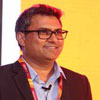ICT Academy was started with a vision to connect industry and academia in terms of knowledge sharing and skill development.
In this process, around 800 higher educational institutions are being associated with ICT Academy so far; where, ICT Academy partners with major tech giants to get support in terms of technology sharing and content for the skill development of faculty members and students.
ICT Academy acts as a bridge between industry and academia. This event, Bridge is one such initiative to connect industry and academia and it is a unique conference of its kind that gathers thousands of faculty members across India to empower them as the agents of change in fostering India for Industry 4.0.

Krishna Bodanapu,
Managing Director and CEO
Cyient
Future is going to be different from the past. Technology evolves faster, than any time in the history. Few technologies become obsolete even before it’s adopted by the entire world. Technologies like IoT, Big Data Analytics, Robotics and Automation, Artificial Intelligence and AR & VR are going to change the future world. When these technologies are in place, problem solving skill will be crucial in the future. Technologies like IoT and Big Data are meaningless, unless a problem solver interprets these technologies to solve a real-life problem using its data. Therefore, creating people who are adaptable, willing to learn and being creative in approach is the need of the hour. However, people being strong in their fundamental domain is more important to use these technologies. Civil Engineers without strong knowledge in Civil Engineering cannot use the IoT technology to solve a problem in their domain. So, institutions should build students on their fundamentals rather than replacing it with these technology skills. If their fundamentals are strong, then getting equipped with these technology skills would add real value.

Padma Shri CA T N Manoharan
Chairman
Canara Bank
The key takeaway for an entrepreneur is to realize that fortunes can change plan for a rainy day, always. When ego is hurt in the pursuit of making career in entrepreneurship, humility helps in adversity. An entrepreneur or an aspirant entrepreneur should be answerable to the conscience. Use of the heart and head appropriately is required when there is a bout between opportunities Vs temptations. Following principles and adhering to values makes enterprises eternal. Vision,competence and hard work may take one to the top but integrity is needed to stay there, one bad conduct can wipe out all good deeds.

Dr Anil D Sahasrabudhe
Chairman
AICTE
Over the decades, AICTE has evolved from being an education regulator to an education facilitator. As a part of facilitating, AICTE has initiated several initiatives towards the skill development of students. Employability Enhancement Training Program being held in the educationally backward North Eastern states is one such program to enable the students through education. India, on the education front has changed its outlook with respect to the evolving industry trends. The recent National Education Policy focuses on knowledge creation, knowledge dissemination, improving soft skills, focusing on ethics and values, and promoting MOOCs and blended learning. Aligning with the vision of the country, AICTE has made several new initiatives such as regular revision of curriculum by industry and academic experts, making it mandatory for teachers to get trained and certified on pedagogy and new technologies, mandating 3 week of student induction programs on ethics, mandating internships, mandating industry interaction cell in institutions and programs to promote innovation and startups. Adding to it, AICTE has added a new program, National Doctoral Fellowship that is intended to promote research in AICTE approved institutions through scholarships. Other key initiatives are Smart India Hackathon and establishment of National Skills Qualifications Framework (NSQF). NSQF is an initiative that provides students who passed 8th standard and school dropouts the opportunity to get trained on vocational skills and get placed in respective sectors.

Durga Prasad Kakaraparthi
Solutions Architect
Amazon Web Services
From the industry point of view, Big Data, IoT and Machine Learning will be driving the industries. As of now, AWS concentrates only on machinecentric interfaces such as Green Screen, GUI, web and mobile, but in future it will be humancentric world. In the near future, the number of devices is going to increase by 5 times i.e., more than the population of human beings. So, the future skills will be based on how these devices interact with each other, how humans would interact with these devices and how humans would communicate with each other.
From the student point of view, the way a student learns is changing dramatically. A new culture of learning and culture of innovation in institutions is becoming most important for the development of students. Not every big idea is an innovation, an idea that really impacts life and disrupts is real innovation. At Amazon, innovations like drones to deliver goods and products like Alexa are really changing people’s life. That’s why Amazon invests heavily on the future technologies.
To enable students on these evolving technologies, AWS Educate, an initiative of Amazon, helps students to get skilled on the trending technologies such as Cloud. With the increasing demand for Cloud employees, AWS Educate provides an academic gateway for the next generation of IT and Cloud professionals. It provides students and educators with the resources needed to accelerate Cloud-related learning. Further, as an initiative of AWS Educate in association with ICT Academy, “Cloud Literacy Month” is being organized to be conducted at institutions across India, to nable students to learn basic cloud technology skills.

Anand Pillai
Education Lead -India & SAARC
Autodesk
Today, I am here to talk about the future of making and how technologies of Industry 4.0 like AI and automation play an important role in Design and Engineering. In 2050, 68% of the 10 billion populations will live in cities and there will be growing demand in all the day-to-day technology products we use. So, we should create more products that are inevitable, but with less resources. Though we create innovative products with skilled manpower to meet the growing demand, we need to reimagine a way to build products. We should nurture innovation and bring in essential workforce skills to reduce global wastage in future. The true opportunity lies in preparing ourselves for the uncertain future through automation. Automation is elevating the job roles to the next level. Innovation is helping the entire ecosystem to improve the efficiency and reduce the complexity in production. Ultimately automation is driving the next generation workforce across the spectrum of Industries. Hence, working with technology and tools to foster co-creation is the new way of doing things.

Dr. Neetu Bhagat
Deputy Director
AICTE
Internship is a globally ecognized model for the development of student skills.Most developed countries have embedded internships as a mandatory model in their education system.
Similarly, AICTE has made internships mandatory for all technical students. The relationship between industry and academia is like a consumer and producer. Unless the consumers give feedback and suggest the producer on the quality, it is hard for the producer to create products to suit the needs of the consumer.
Therefore, industries should see internship as a supportive model to enhance the quality of education and should provide opportunity for the students to explore their work environment. To encourage internships, AICTE has made the duration of the internships flexible according to the interests of the students and the institutions.
Institutions can extend the internship period from one month to even 6 months. Students interested in pursuing entrepreneurship can spend the summer vacation on entrepreneurial activities, which will be considered equivalent to internship and be accounted for academic credits.
AICTE has introduced Activity Point Program, where students have to be involved in a rural community activity for the benefits of the society. Exploring the problems of rural communities and providing apt solutions, would also make students to come out of their comfort zones such as air conditioned classrooms, sophisticated infrastructures and learn from the difficulties of real life situations. Academic institutions should focus on the internship model and create awareness among students about the value of internship during the college days.

Denny P Julius
Director - IoT
Tata Consultancy Services
Majority of the processes in factories and manufacturing industries are becoming more automated and robotics is being implemented eventually; since robotics is included, preventive maintenance is also implemented. In recent times, communication is happening between machines in order for the sequencing and the process flow.
This is possible because of all the small sensors that are being installed into these machineries.These smart implementations fetch lot of data that gives us a better analysis on how the factory is performing, which is an important data to be observed. Also with this data, the factoryto- factory communication is also possible where huge companies present in various geographical locations can use this data.
This is basically what Industry 4.0 is. The technologies used are IoT, Cloud Technology, etc. With the help of the advancements in technology, we are now able to give IP address to any device that is connected to the network through which we are able to operate the connected devices remotely. That doesn’t end there; with these data, a maintenance engineer can visualize the whole process through Augmented Reality and Virtual Reality.
Elseways, with all these technological advancements, cyber security is at stake as well. So, we will have to take a counter measure on cyber security.

Meka Venkata Chalapathy
Senior Director - HR
Virtusa
The usage of mobile phones is expanding at very fast pace. People now, are hesitant to open their laptops; they like to accomplish things using just their mobile phones. From end users’ point of view, mobile phone is one of the major drivers of the Industry 4.0. Technologies like Big Data, Cloud Computing of 4.0. So, there is a need for people to work on these technologies. People should be technology-specific rather than being technology relevant. People with expert skills will stay in the industry and people with mediocre skills will fade away. It is obvious that the evolution of industry is dynamic as it is based on the changing expectations of the end user or consumer. As long as the industry is dynamic, the skill gap prevails. So, learning should happen constantly with people to stay relevant with the changing trends.
With respect to skill development, Virtusa collaborates with academic institutions by establishing Centre of Excellence to train faculty and students on particular technology. On the other hand, we have provided hands-on working experience for 35 faculty members from institutions across India by making them spend a month in the Virtusa campus as a fresher. Going further, we conducted contests for students, where they came with problem statements of their own. After evaluating the problem statement they were asked to come with solutions to their own problems using an app.
As a reward, the best contenders were provided with job offers in Virtusa. This model enabled the students to gain exposure to the industry trends and learn how corporate offered solutions to a particular problem.

Kiran Challapalli
Client Solutions Architect
IBM
Industry 4.0 is all about cyber physical system. Cyber physical system is a mechanism that is controlled or monitored by computer-based algorithms, tightly integrated with the Internet and its users.
By 2025, the Industry 4.0 will be a 20 trillion dollar industry globally. The key trait of Industry 4.0, is its ability to make the machines perform on par with engineers, i.e., the intelligence of a machine can match the intelligence of a human being. So, managing these machines has become crucial.
Major technologies that augment Industry 4.0 are:
- IoT
- Big Data Analytics
- Robotics and Automation
- Artificial Intelligence
- AR & VR
Technologies evolve exponentially that the machines are able to suggest human beings on what has to be done. This opens up a whole new level of job opportunities for the students. As of now, the majority of the skills required are IT related, but things might change, because of the evolving technologies.

Rohit Pareek
Senior Director - UGBU Product Development
Oracle
By 2025, every cloud application will have some element of Artificial Intelligence embedded in it. 85% of customer interaction will be automated. IT industry will have almost 60% of new trending jobs In future, businesses should make their core functions digitally enabled and automate their process, which will reduce 40% of their
Academia should teach the technologies of industry 4.0 to the students to stay relevant and updated. It’s no more machine learning instead its human learning about the machine. It’s the era of Deep Learning, where a machine can learn anything within few hours by comparing the data for years and replicate the outcome with the best results which humans take years to achieve. Machines are becoming creative. So, humans should learn the machines better expenses. Introducing innovative ideas in the business will make the business sustain for a longer period.
Companies should provide their customer with the next level of experience using the technologies of Industry 4.0. In industry 4.0, data fetched from automated devices will be an asset. Companies should increase their ability to use these data in more innovative ways to sustain in the business.
Therefore, Data Analysts with the knowledge of such data asset can predict the future outcomes, reduce the cost of business using data prediction, track any business program and provide better visibility in operations. Therefore, it is mandatory to advance computing education globally, for the welfare of future generation.

Pundi Sriram
Co-Founder and Head
STEP (The Hindu Group)
We are operating in a global world where empowering Indians in English is a key part of success for them in the workplace; that is the mission of STEP. As part of the journey, we thought one of the key ways to skill youth in India is through communication skills and English language development.
The world around us is changing with new technologies. Jobs in the middle, white collar clerical jobs or even some blue collar jobs are getting automated, like robots moving around in the Amazon warehouse. So, jobs in the future will be cognitively demanding, which require more thinking capability. People should have the critical thinking skills, problem solving skills, and skills to collaborate; of these skills, there is one theme underlined – that is the language. Language is the basic tool which human beings use to interact with each other. To think critically, people must have the capacity to understand what is being said, absorb information, process it and interpret it in different ways.
We must make sure that our students possess language skills to work in whatever environment they find themselves in the future. We have to create an environment where English becomes the common medium of conversation, rather being a medium of instruction. There are good learning tools available on the Internet, even at locations where good quality teaching and training are not available.
STEP’s unique online programme helps students and teachers to improve their listening, speaking, reading and writing skills. Our programme would also help students to gain the language skills to achieve in interviews and group discussions. However in future, the nature of jobs may change, but I think, English language communication skills will be critical in future as well.